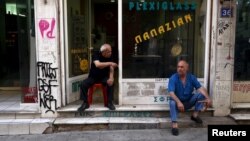Greece's banks received a new cash injection from the European Central Bank on Wednesday, ahead of a key vote in parliament on judicial and banking reforms needed to secure crucial bailout funds from international creditors.
An ECB official neither confirmed nor denied to VOA reports that the ECB decided to increase Emergency Liquidity Assistance to Greek banks by about $980 million, the second such cash injection in just under a week.
Earlier in the day, Greek Prime Minister Alexis Tsipras met with bankers as lawmakers began another emergency debate on a second package of reforms demanded by the ECB and the International Monetary Fund.
Greek banks reopened Monday for the first time in three weeks, but capital controls remain in place.
During the meeting with bankers at his office in Athens, Tsipras stressed the need for a stable banking system.
"What is important right now is that the system returns back to normal. And at the same time, we have to ensure that our vulnerable citizens will not be harmed by the new developments," said Tsipras.
Speaking to reporters after the meeting with the prime minister, the president of the Hellenic Bank Association, Louka Katseli, said the return to banking normalcy was in everyone’s interest.
"Together with the prime minister, we discussed the next steps we must take to ensure that the banking system returns to normal. It is everyone's goal that this difficult period comes to an end and all the restrictions on capital movement and withdrawals are gradually lifted," said Katseli.
The vote is seen as less controversial than last week's package, which included spending cuts and pension reforms but managed to pass despite a rebellion within the prime minister's Syriza party.
The pro-government newspaper Avgi has called Wednesday's vote a "crash test" for the Syriza party that could determine whether the government survives or whether the prime minister is forced to resign.
Depositors have swarmed into banks to tap their accounts. While the government eased restrictions on withdrawals, the amount of money people could take out of their accounts was still limited to $455 per week.
In the three weeks prior, the government had allowed withdrawals of only $65 a day from streetside cash machines.
Greek consumers and tourists also faced 13 to 23 percent higher taxes on a series of consumer goods, including coffee, restaurant meals, taxis and ferries to Greek islands. The levies were part of a new austerity plan that Greece was forced to accept in order to reopen talks with the lenders on a $93 billion bailout, which would be its third in five years.
Greece also managed on Monday to make payments of more than $6.5 billion to two of its creditors, the European Central Bank and the IMF, after securing more than $7 billion in temporary financing from a European emergency fund.
The Washington-based IMF said it "stood ready to continue assisting Greece in its efforts to return to financial stability and growth," once it repaid the more than $2 billion it owed.





